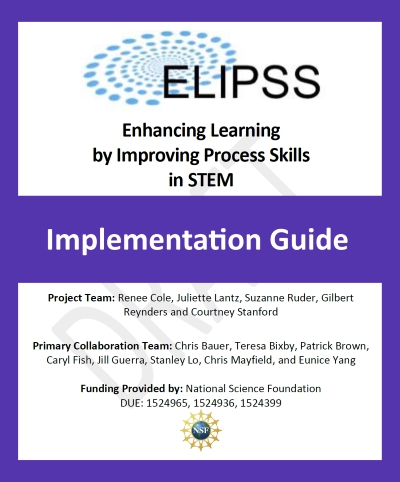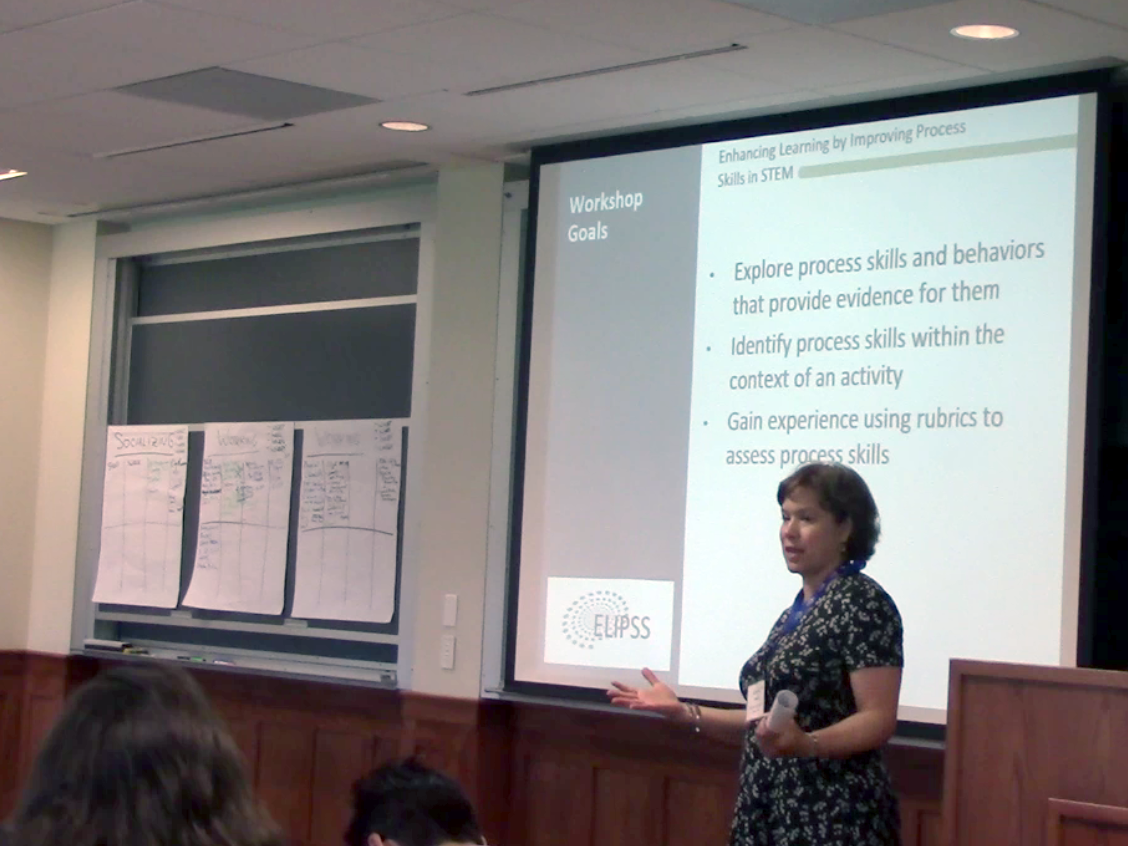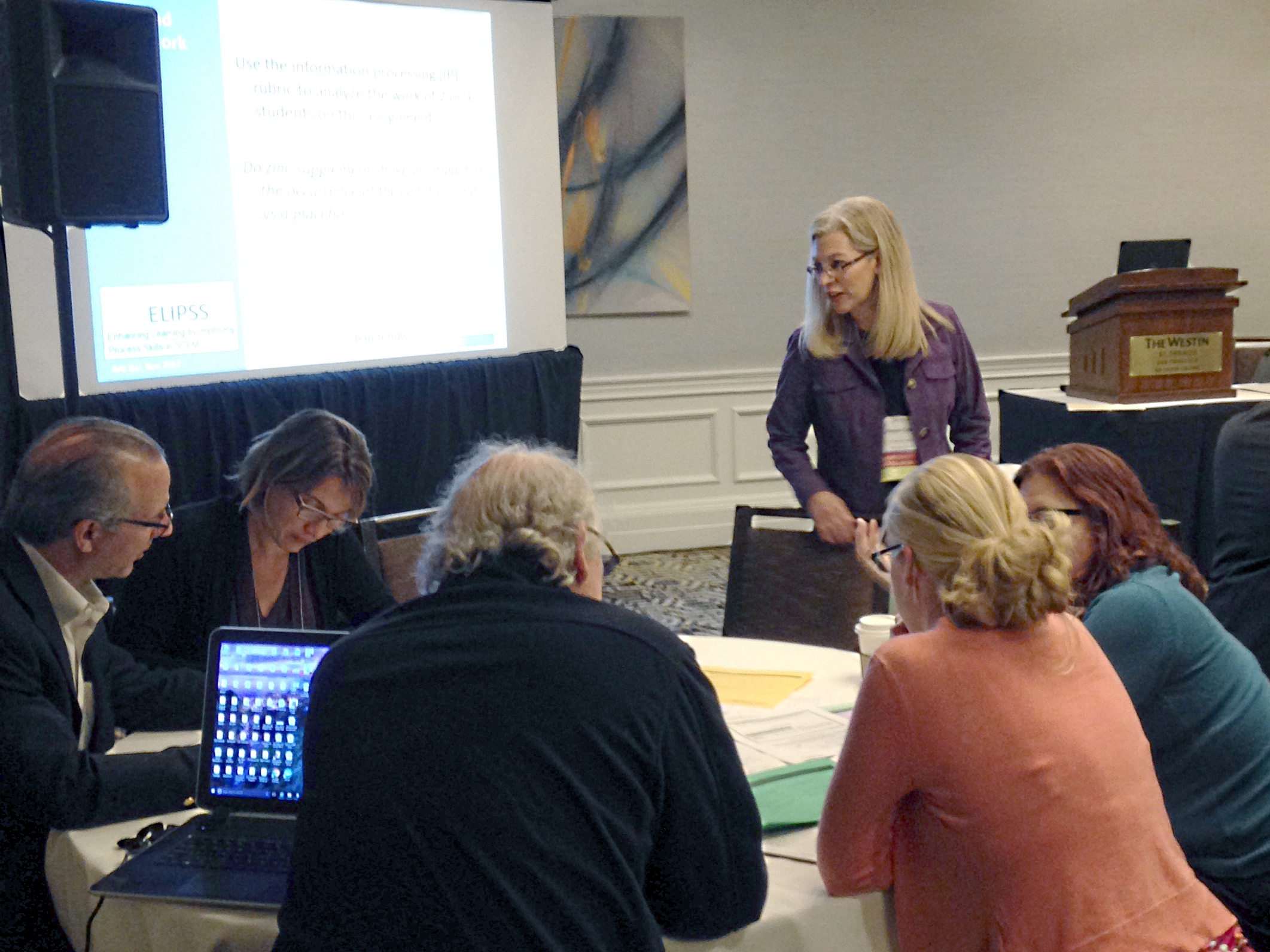Implementation Guide
Instructors will find many strategies, materials and course suggestions in this implementation guide.

Workshops
The ELIPSS team has designed and facilitated numerous workshops; these have appeared at both disciplinary and multidisciplinary national and regional conferences/venues. Workshops range from 1.5-3 hours and can be combined to provide an extended professional development experience.
A variety of workshop modules have been developed that address a range of topics and experience levels. Click here to learn more.


Implementation Videos
Strategies for facilitating and assessing transferable skills.
2021 STEM For All Video Showcase
https://videohall.com/p/2052
Skills such as communication, teamwork, critical thinking, and problem solving are frequently cited as important outcomes for STEM degree programs, as well as being part of the science practices promoted by the NGSS. The Enhancing Learning by Improving Process Skills in STEM (ELIPSS) project has developed materials and strategies that support the facilitation of these skills. These materials include rubrics that can be used to assess student interactions and completed work and provide students with feedback and suggestions for improvement to further their progress.
These feedback rubrics and accompanying implementation strategies have been employed at a wide variety of institutions, across a broad range of STEM disciplines and varying class sizes. Approaches have been developed for providing students feedback and support in both in-person and virtual classroom settings. Assessments are completed by students, by the instructors, or classroom learning assistants. Rubrics can be completed in many formats, including paper, electronic platforms, and through the use of student response systems. A summary of implementations and commentary on successful entry strategies from early adopters will be highlighted.
Enhancing learning by improving process skills in STEM.
2020 STEM For All Video Showcase
https://videohall.com/p/1659
Skills such as communication, teamwork, critical thinking, and problem solving are frequently cited as important outcomes for STEM degree programs. However, the development of these skills is often taken for granted, and they are not often explicitly discussed or assessed in the classroom. Assessment serves two purposes: (1) providing a measure of achievement, and (2) facilitating learning by conveying what is valued in a course. This project has developed feedback-focused rubrics that serve as a resource for instructors to assess and support student skill development. Faculty and students from multiple institutions representing multiple STEM disciplines have verified the validity and utility of these rubrics in a variety of STEM courses. Implementation of the rubrics has been shown to positively impact faculty reflection and student outcomes.
Assessing process skills in a subsection of groups within the class.
Undergraduate introductory anatomy & physiology course (100-110 students)
Submitted by Dr. Patrick Brown, East Tennessee State University
Process skills feedback was provided to students in a large, fixed seating classroom while also managing group POGIL activities. Each class session, the instructor focused on a single group and recorded their interactions using a video camera. After class, the instructor observed the recorded group and scored their interactions using the ELIPSS rubrics. The feedback was later provided to the whole class.
Providing process skill feedback to students in real time
Undergraduate introductory calculus course (35 students)
Submitted by Dr. Jill Guera, Harvard University
After initially introducing process skills on the first day of class, the instructor and course assistants monitored student groups throughout the room and provided feedback to students as they worked. Students were given laminated copies of analytic rubrics for the instructor and course assistants to write down notes, avoiding any interruptions in student work. This allowed students to review rubrics and implement suggestions during the class period.
Providing feedback to students on group project proposals
Undergraduate database systems computer science (25-30 students)
Submitted by Dr. Chris Mayfield, James Madison University
Students were assigned a semester-long proposal project to write together as a team. Students first went through a peer review process based on the ELIPSS analytic written communication rubric before the instructor provided feedback. Pros and cons of this method are described.
Incorporating rubrics into an online learning management system
General chemistry laboratory (120 students)
Submitted by Dr. Rebecca Sansom, Brigham Young University
Several times throughout a semester, students were given support on how to think about process skills and complete rubrics. Students were asked to evaluate themselves after each lab and were given a process skill component (row) and examples of each level (1-5). The instructor read responses and provided online feedback throughout the semester.
Promoting productive team behaviors during class using a student response system
Undergraduate general chemistry course (180-240 students)
Submitted by Dr. Chris Bauer, University of New Hampshire
During class, students provided ELIPSS rubric ratings of their team performance by entering in a string of scores (for each rubric category) using a student response system (clickers). This allowed assessment of consistency within and between teams. Different data displays offered options for discussing results with students. Clicker questions are shown that assess for and promote productive discourse.
Providing formative feedback to students as they work on research proposals
Undergraduate introductory biology lab course
Submitted by Dr. Stanley Lo, University of California, San Diego
Students were introduced to process skills on the first day of class. Students worked in teams and developed research proposals during the latter half of the course. The interpersonal communication and teamwork ELIPSS feedback rubrics were used by instructional assistants to give feedback as students worked on their proposal projects. Also included is a discussion of challenges of using paper rubrics.
